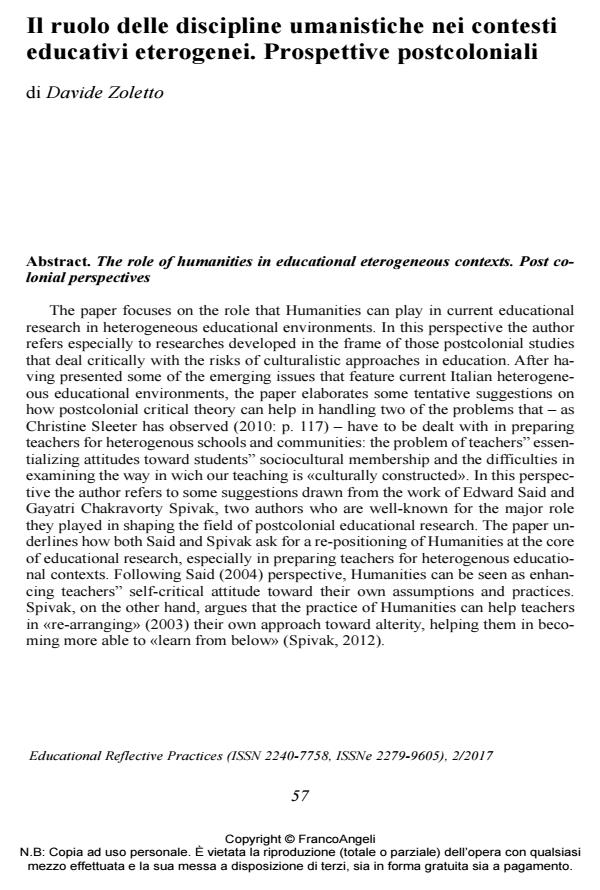Il ruolo delle discipline umanistiche nei contesti educativi eterogenei. Prospettive postcoloniali
Titolo Rivista EDUCATIONAL REFLECTIVE PRACTICES
Autori/Curatori Davide Zoletto
Anno di pubblicazione 2018 Fascicolo 2017/2
Lingua Italiano Numero pagine 14 P. 57-70 Dimensione file 204 KB
DOI 10.3280/ERP2017-002005
Il DOI è il codice a barre della proprietà intellettuale: per saperne di più
clicca qui
Qui sotto puoi vedere in anteprima la prima pagina di questo articolo.
Se questo articolo ti interessa, lo puoi acquistare (e scaricare in formato pdf) seguendo le facili indicazioni per acquistare il download credit. Acquista Download Credits per scaricare questo Articolo in formato PDF

FrancoAngeli è membro della Publishers International Linking Association, Inc (PILA)associazione indipendente e non profit per facilitare (attraverso i servizi tecnologici implementati da CrossRef.org) l’accesso degli studiosi ai contenuti digitali nelle pubblicazioni professionali e scientifiche
The paper focuses on the role that Humanities can play in current educational research in heterogeneous educational environments. In this perspective the author refers especially to researches developed in the frame of those postcolonial studies that deal critically with the risks of culturalistic approaches in education. After ha-ving presented some of the emerging issues that feature current Italian heterogeneous educational environments, the paper elaborates some tentative suggestions on how postcolonial critical theory can help in handling two of the problems that - as Christine Sleeter has observed (2010: p. 117) - have to be dealt with in preparing teachers for heterogenous schools and communities: the problem of teachers" essentializing attitudes toward students" sociocultural membership and the difficulties in examining the way in wich our teaching is «culturally constructed». In this perspective the author refers to some suggestions drawn from the work of Edward Said and Gayatri Chakravorty Spivak, two authors who are well-known for the major role they played in shaping the field of postcolonial educational research. The paper underlines how both Said and Spivak ask for a repositioning of Humanities at the core of educational research, especially in preparing teachers for heterogenous educational contexts. Following Said (2004) perspective, Humanities can be seen as enhancing teachers" self-critical attitude toward their own assumptions and practices. Spivak, on the other hand, argues that the practice of Humanities can help teachers in «re-arranging» (2003) their own approach toward alterity, helping them in becoming more able to «learn from below» (Spivak, 2012).
- Riflessività postcoloniale e ricerca pedagogica nei contesti ad alta complessità socioculturale Davide Zoletto, in EDUCATIONAL REFLECTIVE PRACTICES 1/2023 pp.139
DOI: 10.3280/erp1-2023oa15883
Davide Zoletto, Il ruolo delle discipline umanistiche nei contesti educativi eterogenei. Prospettive postcoloniali in "EDUCATIONAL REFLECTIVE PRACTICES" 2/2017, pp 57-70, DOI: 10.3280/ERP2017-002005